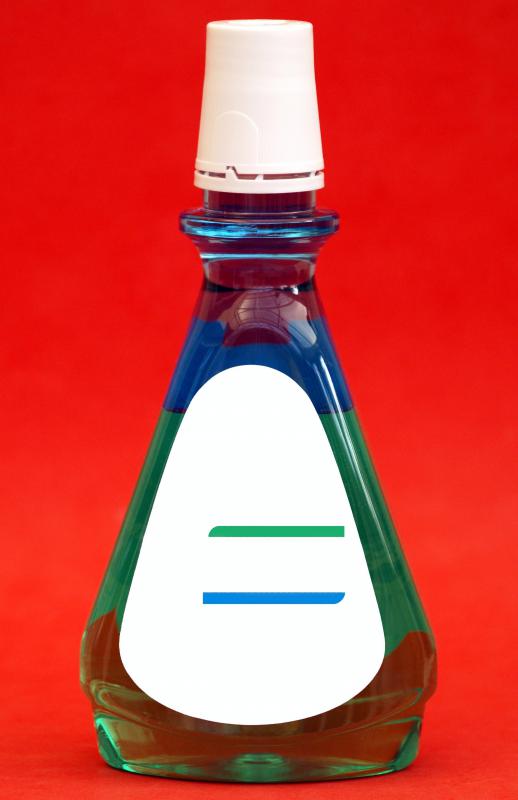At WiseGEEK, we're committed to delivering accurate, trustworthy information. Our expert-authored content is rigorously fact-checked and sourced from credible authorities. Discover how we uphold the highest standards in providing you with reliable knowledge.
What is a FMCG?
FMCGs, or Fast Moving Consumer Goods, are any type of commercial products that are produced at a low unit cost and tend to sell quickly. Typically, a lower amount of profit is made on each individual FMCG that is sold, but the constant demand helps to produce volume sales that help to create a healthy cumulative profit on all units sold within a given period. There are a number of retail products that fit this basic profile, with many of the items found in just about every home around the world.
One of the characteristics that define any type of product as a true FMCG is the fact that it is non-durable. This leads to a continual cycle of consumption that makes it feasible to mass produce the goods. Pre-packaged foods are a good example of this characteristic. The food is purchased, then consumed. When the food is gone, consumers return to a retail outlet to purchase more units of the pre-packaged food.

Toiletries and personal hygiene products are also included in the FMCG classification. Soap, toothpaste and mouthwash as well as toilet paper are non-durable goods that must be repurchased from time to time. Toilet paper is also one of the essential PMCG products found in most homes.
Home cleaning products such as bleach, detergent, dishwashing liquid and glass cleaner would also be identified as an FMCG product. The same is true for rug cleaners, furniture polish, and foam cleaners for sinks and bathtubs.

Pharmaceuticals are also normally classified as a Fast Moving Consumer Good. This includes over the counter medications, creams, and muscle rubs as well as any type of prescription medication. Non-traditional health aids such as vitamin and herbal supplements would also be classified as a FMCG.
Consumer electronics are considered a sub-classification of a FMCG. Known as Fast Moving Consumer Electronics, or FMCEs, items like digital cameras, laptop and notebook computers, and cell phones are excellent examples of non-durable goods within this category. In each case, the FMCE is purchased, used for a period of time, and eventually replaced by another unit of like make and model or one that is more technologically advanced.

There is some difference of opinion as to what type of goods should be classified as a true FMCG. In the United Kingdom, it is not unusual for refrigerators or ovens to be considered an example of a “white good” FMCG. Smaller appliances are also part of the FMCG family and are identified as brown goods. Items such as televisions or portable stereo systems are examples of what is meant by a “brown good.”
AS FEATURED ON:
AS FEATURED ON:















Discussion Comments
I would think that snack food companies must be the most profitable type of FMCG business. People consume the small packages of snacks faster than they go through most other types of food, and they certainly use them up sooner than they use a tube of toothpaste or mouthwash.
I buy boxes of individual snack-size bags of potato chips, and they are gone in a week. I also eat a box of granola bars, a unit of small boxes of dried cranberries, and a bag of individually wrapped mini chocolate bars in one week. So, I play a big part in helping out the FMCG industry.
I'm sure that families with several kids go through even more FMCGs each week. Considering that many households have at least four people, they must purchase these snacks even more often or in more quantities than I do.
It is sad to me that ovens and refrigerators are considered FMCGs. They just don't make them like they used to, I'm told.
My parents got a refrigerator after they got married, and it lasted for thirty years! They say that this could never happen with a newer refrigerator. They are actually designed to give out after a few years so that you have to buy a new one.
I had a technician come to work on my air conditioning unit, and he told me that certain parts of the unit were purposely designed to last only a few years. What an underhanded, terrible method of doing business that is! The air conditioning manufacturers should be ashamed of themselves!
@kylee07drg – I can see how computers would be expensive to replace, but there are deals in place for cell phone upgrades that make this easier on people's budgets. If you have a contract with a cell phone service provider, then generally, you can upgrade your phone every two years.
Some phones are offered for free as an upgrade, but the more advanced and most popular ones are offered at a discount. My husband was able to get a touchscreen phone a couple of years ago for only $50 with his upgrade, and these phones were going for much more than that then.
The only catch is that you have to sign a new two-year contract with the company. This is one way that FMCGs keep companies like cell phone providers doing a lot of business.
I would not have guessed that cell phones and computers would be classified as non-durable goods. It's hard to believe that something that expensive could get replaced on a regular basis.
I do have friends who are technological wizards, and they are always buying the most advanced electronics available. However, my non-genius friends and I stick with our electronics until they wear out. I keep my cell phones until the buttons no longer work, and I still have the same computer I had twenty years ago.
I really don't see how people can afford to replace these things very often. We're talking hundreds of dollars here!
Post your comments